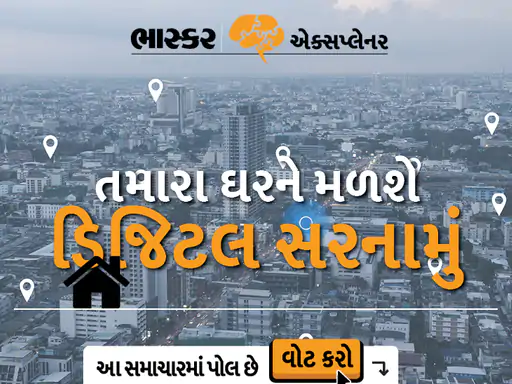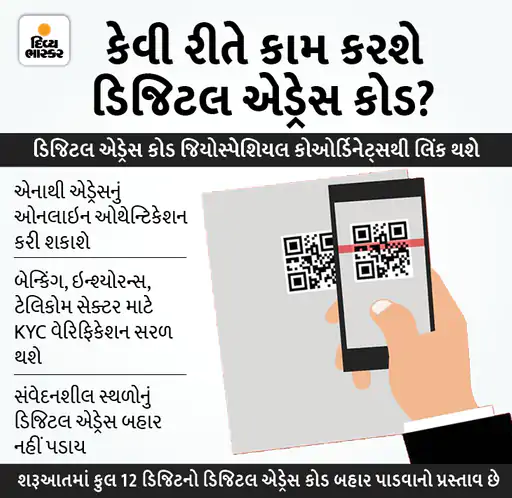A unique code will provide your address information, find out what a digital address code is and how you can benefit from it.
Instead of typing your address, you will soon have to provide a unique code for online delivery and address verification. In fact, the Modi government is soon going to give the country a unique code like Aadhaar for all addresses. Your address will be called this Unique Code Digital Address Code (DAC).
Let's find out now what is a digital address code? How to create a unique code for your address? What are the benefits of digital unique code?
What is a digital address code?
The government is soon going to prepare a digital unique code for all the addresses in the country. This digital address code (DAC) will work as a separate unique code for all addresses in the country. To do this, the government will issue a unique code to verify every address in the country, which will verify the address of the person taking the online delivery instead of its address, which will act as the e-address.
Who is preparing the digital address code
The Postal Department of the Government of India is working towards developing a Digital Address Code (DAC). The Post Department recently issued a draft research paper on its official website asking for feedback and suggestions from all stakeholders on the digital address proposal. The deadline for giving feedback is November 20th. With this, it is believed that the government may soon make a number of announcements regarding digital addresses.
Why the need for a digital address code?
Regarding the need for digital addresses, the Post Department said that Aadhaar is usually used as an address proof, but addresses registered on Aadhaar are not digitally authenticated. At present, this is the only shortcoming with all the address proof documents. To digitally authenticate any address, the address must be linked to a digital location (geospatial coordinates or geospatial index). In these circumstances, digital address identities can be used for online authentication of addresses.
Difficulty in reaching a specific address: Online business transactions have increased and online purchases have also increased, although reaching an address or location for delivery is a very difficult task.
Aadhaar is just proof of address: Aadhaar is usually used for address proof. However, the address in the Aadhaar card cannot be digitally authenticated.
Fake Address Fraud: E-commerce customers are sometimes deceived by using fake addresses, but digitally linked addresses can be authenticated online to prevent fraud.
Addresses will be unique: Very long and complex addresses are not always unique and it becomes difficult to reach such places.
What will be the feature of digital address code?
The DAC will be unique to each address. Address means the unit or office or business related to each person's residence.
The digital address code (DAC) will be linked to the geospatial coordinates representing the address. The coordinates at the anti-gate or gate of the address will represent the address for this purpose.
Its geospatial coordinates should not be disclosed for such sensitive establishments, for which a digital address code will not be issued or it may be linked to neighborhood or city coordinates.
What DAC will look like is unique for each address
An independent home would be an address with a digital address code (DAC).
The DAC will be unique to each address. "Address" means each person's living unit or office or business.
If the house is divided into two parts, a separate DAC will be issued for this purpose with a different address.
Each person in an apartment building will be allotted a digital address code (DAC), which will be linked to the geospatial coordinates of the apartment building or block entry.
The various digital address codes of any corporate office or a government office complex will be linked to the geospatial coordinates of the building in which the office is located.
The digital address code (DAC) will be permanent for each address. If the property representing the address is changed to multiple addresses, each new address will be assigned a new DAC.
How many digits will be the digital address code?
According to the Post Department, there are about 350 million households in India. If all their business and non-business locations are connected, the total number of addresses in the country could be 75 crores. Initially, it is proposed to issue 11 digits + 1 check digit, i.e. digital address code of a total of 12 digits. It can cover about 100 crore addresses if required.
What are the benefits of digital address code?
The proposed digital address code will be linked to geospatial coordinates. This will allow the address to be authenticated online.
This will make the KYC verification process easier for the banking, insurance, telecom and other sectors. It will also reduce the cost of doing business. Aadhaar authentication with DAC online authentication will complete the process of digital KYC.
Delivery services from DAC, especially in the field of e-commerce, will be very productive and the quality of service will be much better.
The advent of DAC will enhance financial and administrative efficiency in all areas such as property, taxation, emergency response, disaster management, election management, infrastructure planning and management, population management and grievance redressal.
Important link
સમ્પુર્ણ માહિતી ગુજરાતી મા વાંચવા અહિ ક્લિક કરો
The digital address code will make the details of the government scheme easier to implement.
The Digital Address Code (DAC) is also expected to reshape the government's One Nation One Address (ONOA) scheme.











No comments:
Post a Comment